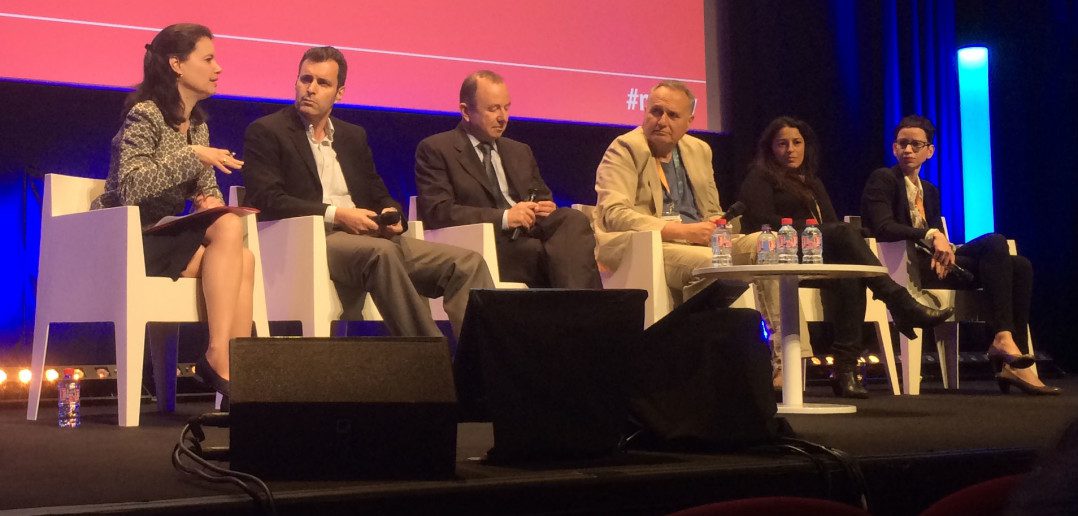Israel is currently a hotbed for scripted and unscripted TV formats alike, with the global success of Homeland – based on Israeli drama Prisoners of War – just the spearhead for a new wave of dramas travelling beyond their home country. This morning at MIPTV, a panel of Israeli executives convened to discuss the lessons they’ve learned about creating successful scripted formats.
The panel included Avi Armoza, CEO, Armoza International Media; Revital Basel, VP Sales, Dori Media Group; Ehud Miron, president & CEO, Ananey Communications; Yoram Mokady, VP content, HOT; and Keren Shahar, head of distribution and acquisitions, Keshet International. It was moderated by World Screen’s group editorial director Anna Carugati.
« When you sell a non-scripted show, you sell a formula. But when you sell a scripted format, you sell a remake of a script, » said Armoza, on the advantages foreign broadcasters can find when buying Israeli scripted formats. « You buy three years of development, and the best Israeli scriptwriters sitting together to put seasons one and seasons two… You can get quickly into something that is fully written and fully developed. »
« The buyer has the ability to change whatever he wants: turn around the story and format, or stick to the story but make the right adjustments to suit his country or subscribers… He has the agility to tailor the content to its own needs, » agreed Mokady. But Basel suggested that « a good story travels: if scripts are good, they can travel anyway! »
Why is Israel such a hotbed of creativity? « In a way the new world came to us, and not us to the world, » said Miron. « The whole thing started five years ago. The creators – young people of 30 and 40. Until 1990 there was no television in Israel: one channel, black and white, government channel, very boring. But the kids that are creating now grew up on MTV… Those kids that grew on that television now are starting producing. »
Mokady suggested that there is a lot of talent, which was « waiting to explode » when the Israeli TV industry opened up. « Also, it’s a small country, and if it’s a small country it means you have to produce on budgets that are significantly lower than other countries. If you have a low budget, you better come up with a good story, because you can’t cover it up with bigger production values. »
Miron noted that the intense competition between Israeli production companies is also a factor in the current success, but also suggested there is something intrinsic to the creative culture of the country that is spawning innovative drama. « They always say ‘thinking out of the box’. Israelis don’t believe in the box! »
Shahar was asked about Prisoner of War [Hatufim in its Israeli title] and Homeland, with Carugati asking how much leeway Keshet allowed to the overseas producer to tailor the story to their audience. « We all know an American client is not like other clients necessarily! » she said. More difficult? « ‘I’m not sure about difficult, but the Americans: there’s a reason why they’re buying the scripted format… But the leeway to the American market is bigger, » she said.
« We did that with Hatufim, and it’s fine. I think a scripted format needs to change and be adapted as much as it needs to for that market. That’s fine. As long as your partner on the other side gets the essence of the show, an the engine of the show, and lays out to you what his vision is for his audiences. That’s fine. »
She said that the differences are clear in the two shows. « Homeland went to the more – for a lack of a better word – action direction. There’s a threat on national security. Hatufim as I see it… is more a family drama. It’s about these people being away for 17 years. One of them his then-fiancée went on to marry his brother. The other one on the other side kept loyal and fought every day to bring him back. And these two guys came back and were strangers to their family… So yes, there’s a lot of differences, but there are also a lot of similarities which are in the sensibility. »
Armoza talked about the importance in the US of « building the package » – not just selling a format, but finding the right showrunner and producer to remake a drama. « The process is long, and each part of the process is a junction where you can move forward, or go backward to square one, » he said.
Basel talked about some examples, including a show involving a psychologist as the lead character. « Sometimes local culture and sensitivity is very important. For example, in Japan they could not do that a grown-up person would go to a psychologist. So we had to do him as a high-school counsellor… In Russia, it was the only place in the world that the therapist was a woman, because they will not go to a man therapist… These kind of things! »
The conversation turned to cost-effectiveness, with Miron suggesting that taking scripted formats to the US isn’t about boasting how affordable they’d be to produce. « You are standing in a line for a lottery, and you have so many chances for success, and for them success is only when you reach the fifth season, not the first season, » said Miron. « They don’t care so much [about cost-effectiveness], because they really want to put all the money so they can have the best possible one [chance]. »
Basel cited a US agent’s advice: « Don’t sell cheap! Don’t tell them it’s cost-effective! » but said that in Europe and Asia, cost-effectiveness is more appreciated. « They appreciate the mileage that you can save them. Except in the US, it’s really working. » Armoza talked about another show set entirely within a police station: cost-effective to produce, but more importantly in his view, a restriction that puts more focus onto the story and characters.
Is drama easier to adapt than comedy, wondered Cargutai. « You know what they say in Hollywood: everybody can make you cry, but very few can make you laugh! » chuckled Armoza. Shahar talked about Traffic Light, Keshet’s show which is the top-rated comedy in Israel, and was sold to 20th Century Fox for the US. « They toned it down, and I’m being uncharacteristically diplomatic when I say that, » she said, talking about the show’s focus on women who « dominate their men ».
« When the Americans came to adapt the scripts, apparently you can’t have dominant women on network television in the States. So the women became soft. They took out the sting, I think. And by the way, this is what the Americans loved about the Israeli show. But in order to adapt the humour to network television – maybe if it had been cable it would have been a different story – it needed to be toned down. And it didn’t work in the US. The series aired for one season, and that was it. »
Shahar talked about more positive developments: Hatufim aired in more than 20 other countries in its Israeli version, and found committed audiences. « I would never have imagined that Hatufim would travel as it did. It is such an Israeli story: the issue of prisoners of war is so in the centre of Israeli dialogue. And it’s even a controversial issue for us. But that goes to show that this drama is not about the prisoners of war, that’s why. » In other words, it’s about the families.
Shahar also said that Keshet is seeing « broadcasters shifting their budget more and more from acquisition to local productions, because they realise the locality of it gives them higher ratings higher exposure, » she said. And this is increasing the demand for scripted format acquisitions.
Mokady agreed, and said that there are also much less restrictions in terms of structure, partly fuelled by the growth of video-on-demand platforms. Series might be a few episodes long, or 25 or even 50+ episodes in length. « The stories are better written, and the number of episodes are suited for the story. And sometimes even the length of episodes changes from episode to episode, » he said. « It means you have a tighter and better story, and more room for the creators to write the story they want to write it. »
The panel finished off by talking about the future. Basel says she’s seeing much more interest in co-productions with Israeli companies from overseas, where foreign money helps to fund new dramas. Miron said that there is impetus for Israeli producers to break through the « glass ceiling » of their home market – which is mature in terms of its size – and find partners abroad.




